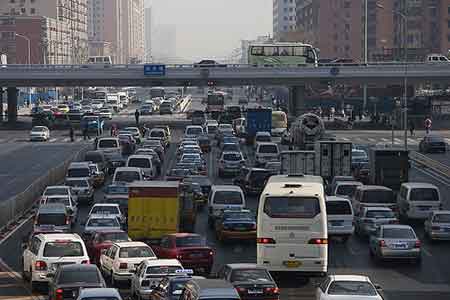 |
|
File photo of Beijing traffic. The IBM Commuter Pain Index survey ranks the emotional and economic toll of commuting in 20 major cities around the world.(Agencies) |
|
Commuters in Toronto and Montreal may spend a lot of time in their cars, but a new survey shows they have a relatively stress-free commute compared with others. The IBM Commuter Pain Index survey ranks the emotional and economic toll of commuting in 20 major cities around the world. Toronto and Montreal were both a part of the survey with the latter finishing at the bottom of the list and Toronto finishing fifth from the bottom. Mexico City topped the list with Shenzhen, Beijing, Nairobi and Johannesburg rounding out the top five. New York finished one point above Toronto. "Commuting doesn't occur in a vacuum," said Naveen Lamba, IBM's global intelligent transportation expert, in a statement. "A person's emotional response to the daily commute is coloured by many factors — pertaining both to traffic congestion as well as to other, unrelated, issues. This year's survey indicates drivers in cities around the world are much more unsettled and anxious compared with 2010." The survey includes questions about commuting time, time spent in traffic, the price of gas, stress, anger and how traffic affects work. Globally, 42 per cent of people say their stress level has increased and 35 per cent say they get angry because of traffic. While 23 per cent of people in Toronto say congestion is better, 40 per cent are more stressed because of congestion. IBM surveyed more than 8,000 people on six continents with the majority saying traffic has become worse in the last three years. It points out 40 per cent of commuters say improved public transit would help and the number of people taking transit is up in most places. More people taking transit is a good thing because one expert says cities can't expect to solve the problem by building more roads. "We can't simply build our way out of congestion no matter which city," said Vinodh Swaminathan, IBM's director of intelligent transportation systems, in a statement. "In order to improve traffic flow and congestion, cities need to move beyond knowing and reacting; they have to find ways to anticipate and avoid situations that cause congestion that could turn the world into one giant parking lot." (Read by Nelly Min. Nelly Min is a journalist at the China Daily Website.) (Agencies)
|
多伦多和蒙特利尔的通勤上班族花在路上的时间可能就不短了,但一项最新调查表明,和其它城市相比,这真是小巫见大巫。 IBM近日发布“通勤痛苦指数”,针对全球20个大城市的通勤损失进行了调查,包括精神损失和经济损失。 多伦多和蒙特利尔也在调查之列,蒙特利尔排名垫底,多伦多排在倒数第五。 通勤压力最大的五个城市分别为墨西哥城、深圳、北京、内罗毕、和约翰内斯堡。纽约排在倒数第六。 IBM全球智能交通专家纳文·兰巴在声明中说:“通勤与其它因素互相影响。” “人们对每日通勤的情感反应受到很多因素的影响,和交通拥堵以及其它看似不相干的问题都有关系。从今年的调查来看,全球的司机都比去年更不淡定、更焦躁了。” 调查问题包括通勤时间、交通耗时、油价、通勤压力、交通状况导致的愤怒情绪、交通状况对工作的影响等。 全球来看,42%的受访者认为通勤压力上升,35%认为交通问题给心里添堵。 而有23%的多伦多人认为交通拥堵有所改善,另有40%认为交通拥堵使自己压力更大了。 IBM对来自六大洲的八千多人进行了调查,多数受访者认为在过去三年中交通状况变差了。调查指出,40%的通勤者认为改善公共交通有好处,在大多数受访地区,乘坐公共交通的人数也有上升。 乘坐公共交通的人数增加是件好事。有专家称,解决城市交通问题不能靠多修路。 IBM智能交通系统总监维诺德·斯瓦米纳森在声明中说:“不管在哪里,解决交通拥堵都不能靠修路。” “为了疏导车流,减少拥堵,城市不能每次都做事后诸葛亮,而是要想法预见并避免拥堵的原因,不然整个地球会变成一个巨无霸停车场。” 相关阅读 (中国日报网英语点津 Julie 编辑:冯明惠) |
|
Vocabulary: commuter:a person who travels to work over an appreciable distance, usually from the suburbs to the centre of a city(乘车上下班者,通勤者) vacuum: a state of being sealed off from external or environmental influences; isolation(跟外界隔绝的)孤立状态 colour: to influence or distort(渲染,文饰,歪曲,影响) parking lot: 停车场 |
